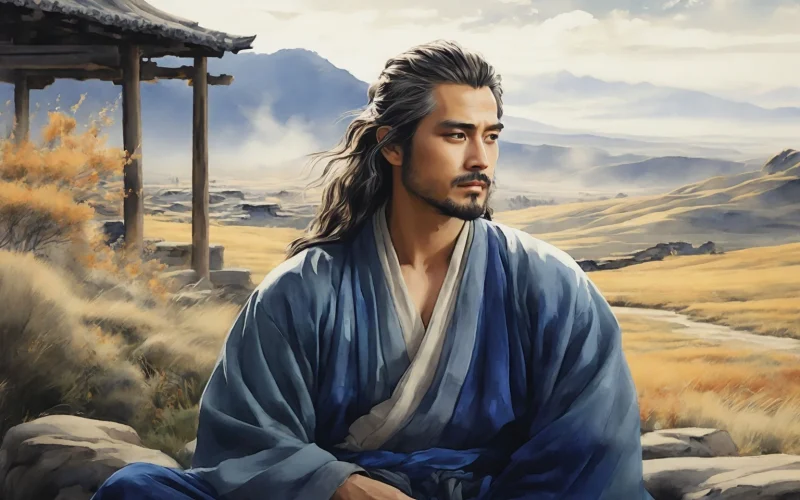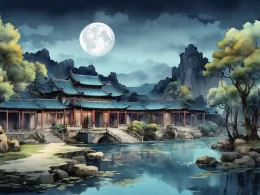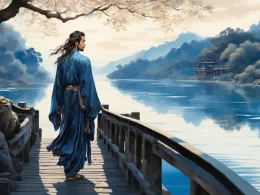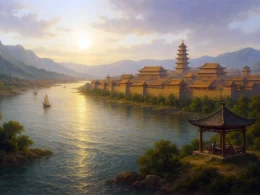The crimson wall—a tomb's lid,
Plum spectres bleed light—
Rotting perfume of yesteryear.
Tears of the dead jewel them,
Corpse-paint washed away,
Revealing necrotic grace.
Last solstice, I feasted alone,
Toasting with plates of ice.
That snow-gnawed gallows—
A censer smoking under death's shroud.
This year, our tryst is a funeral,
Blossoms whisper accusations.
I chant until petals rot,
Falling like condemned souls.
Soon they'll float in poisoned wine,
As I drown in the river of ghosts.
Yet in nightmares, one branch lives—
A hanged man's silhouette,
Twisting over black water.
Original Poem
「花犯 · 粉墙低」
粉墙低,梅花照眼,依然旧风味。
露痕轻缀,疑净洗铅华,无限佳丽。
去年胜赏曾孤倚,冰盘同宴喜。
更可惜,雪中高树,香篝熏素被。今年对花最匆匆,相逢似有恨,依依愁悴。
周邦彦
吟望久,青苔上、旋看飞坠。
相将见、脆丸荐酒,人正在、空江烟浪里。
但梦想,一枝潇洒,黄昏斜照水。
Interpretation
his ci poem by Zhou Bangyan, likely composed during his magistracy in Lishui, exemplifies the Northern Song literati tradition of plum blossom poetry. Zhou masterfully employs the long ci form to project his emotions onto the plum—transforming floral observation into a meditation on transience, memory, and bureaucratic displacement. Through the prism of plum blossoms, the poet articulates nostalgia for bygone days, lamentations on life's impermanence, and subtle self-revelations about his solitary existence. Here, the plum serves not merely as aesthetic object but as emotional vessel, saturated with subjective resonance and exquisite melancholy.
First Stanza: "粉墙低,梅花照眼,依然旧风味。露痕轻缀,疑净洗铅华,无限佳丽。"
Fěn qiáng dī, méi huā zhào yǎn, yī rán jiù fēng wèi. Lù hén qīng zhuì, yí jìng xǐ qiān huá, wú xiàn jiā lì.
Below low whitewashed walls,
plum blossoms blaze before my eyes—
still wearing last year's grace.
Dewdrops bead lightly,
as if she's washed away court powder,
reveiling peerless beauty.
The opening juxtaposes architectural containment ("low whitewashed walls") with floral radiance ("blaze before my eyes"). The blossoms' "last year's grace" (旧风味) immediately temporalizes the scene, invoking memory's persistence. Zhou's genius lies in transforming dew into cosmetic residue—the "washed away court powder" (净洗铅华) metaphor recasts the plum as a noblewoman who has removed her makeup, achieving transcendent natural beauty. This botanical transfiguration elevates the plum from mere flower to aesthetic ideal.
"去年胜赏曾孤倚,冰盘同宴喜。更可惜,雪中高树,香篝熏素被。"
Qù nián shèng shǎng céng gū yǐ, bīng pán tóng yàn xǐ. Gèng kě xī, xuě zhōng gāo shù, xiāng gōu xūn sù bèi.
Last year's glorious viewing—
leaning alone by icy platters
amid feigned banquet joy.
More precious still,
those snow-laden lofty boughs,
like incense curling through white quilts.
Memory crystallizes in sensory shards—the tactile "icy platters" (冰盘) contrasting with "feigned banquet joy" (宴喜), exposing emotional isolation amidst social ritual. The surreal simile comparing snow-draped branches to "incense curling through white quilts" (香篝熏素被) achieves visionary brilliance, blending olfactory (incense), visual (snow), and tactile (quilts) sensations into one transcendent image of winter's ephemeral beauty.
Second Stanza: "今年对花最匆匆,相逢似有恨,依依愁悴。吟望久,青苔上、旋看飞坠。"
Jīn nián duì huā zuì cōng cōng, xiāng féng sì yǒu hèn, yī yī chóu cuì. Yín wàng jiǔ, qīng tái shàng, xuán kàn fēi zhuì.
This year's flower-gazing rushes by—
our meeting seems tinged with regret,
lingering, sorrow-withered.
Long I chant and gaze,
only to watch petals spiral down
onto mossy ground.
The stanza pivots to present urgency, where even nature conspires in melancholy—blossoms "tinged with regret" (似有恨) through pathetic fallacy. The poet's protracted gazing ("long I chant and gaze") makes the eventual petal-fall (飞坠) more poignant, the "mossy ground" (青苔上) receiving them like a verdant funeral shroud. Time's ravages manifest in this quiet descent from bough to earth.
"相将见、脆丸荐酒,人正在、空江烟浪里。"
Xiāng jiāng jiàn, cuì wán jiàn jiǔ, rén zhèng zài, kōng jiāng yān làng lǐ.
Soon we'll see
their tart fruits flavoring wine—
while I drift alone
through mist-wrapped river waves.
Zhou juxtaposes future conviviality ("fruits flavoring wine") with his own projected isolation ("mist-wrapped river waves"). The "tart fruits" (脆丸) symbolize life's cyclical return, while the "empty river" (空江) reflects existential solitude—a masterstroke of spatial and emotional contrast.
"但梦想,一枝潇洒,黄昏斜照水。"
Dàn mèng xiǎng, yī zhī xiāo sǎ, huáng hūn xié zhào shuǐ.
Now I can only dream
of that lone untrammeled branch,
at dusk
slanting across water.
The closing image distills the poem's essence—the "untrammeled branch" (一枝潇洒) represents artistic and spiritual freedom, its reflection in twilight waters merging reality and imagination. This "slanting" (斜照) posture embodies the plum's (and poet's) resilient elegance amidst life's oblique pressures.
Holistic Appreciation
Zhou constructs a diptych of temporal and botanical persistence versus human transience. The first stanza's "last year's grace" plum blossoms, enduring in beauty, contrast with the second stanza's "sorrow-withered" present and "drifting" future. The poem's structural brilliance lies in its seasonal progression—from winter's snow-quilted boughs (first stanza) to spring's petal-fall (second stanza's middle) to summer's fruiting (second stanza's end)—mapping nature's cycles against bureaucratic displacement's linear exile.
The work achieves sublime tension between concrete observation and metaphysical yearning. While grounded in sensory details (dew-beaded petals, mossy earth), it ascends to symbolic realms where the plum becomes an emblem of artistic integrity ("untrammeled branch") and the poet's own wandering spirit ("mist-wrapped river").
Artistic Merits
- Cosmetic metaphor
The "washed away court powder" (净洗铅华) transforms botanical observation into cultural commentary on natural versus artificial beauty. - Thermal paradox
"Icy platters" (冰盘) amidst "feigned banquet joy" (宴喜) encapsulate emotional isolation in social settings. - Phenological precision
The progression from snow-covered boughs to falling petals to fruiting mirrors nature's inexorable cycles. - Oneiric geography
The final "dreamed branch" (梦想一枝) slanting across water merges memory, desire, and artistic vision.
Insights
Zhou's poem reveals how artistic creation stems from displacement—the "drifting through mist-wrapped river waves" (空江烟浪里) becomes the necessary condition for imagining the "untrammeled branch" (潇洒一枝). The work suggests that true beauty is always retrospective ("last year's grace") or anticipatory ("only dream"), never fully possessed in the present.
For contemporary readers, the poem models how to cultivate resilience through aesthetic contemplation. The plum's enduring grace across seasons—blossoming through snow, fruiting despite petal-fall—offers an emblem of perseverance that transcends its Song dynasty context.
Ultimately, the poem posits that art's highest function is to capture what slips through our fingers—the "dew-beaded" moment, the "spiraling petal," the "slanting reflection"—and through this capturing, achieve a form of permanence. Zhou's plum blossoms, though subject to time's ravages, attain immortality through his verse, just as his bureaucratic wanderings, though painful, generated these very masterpieces of longing and remembrance.
About the Poet
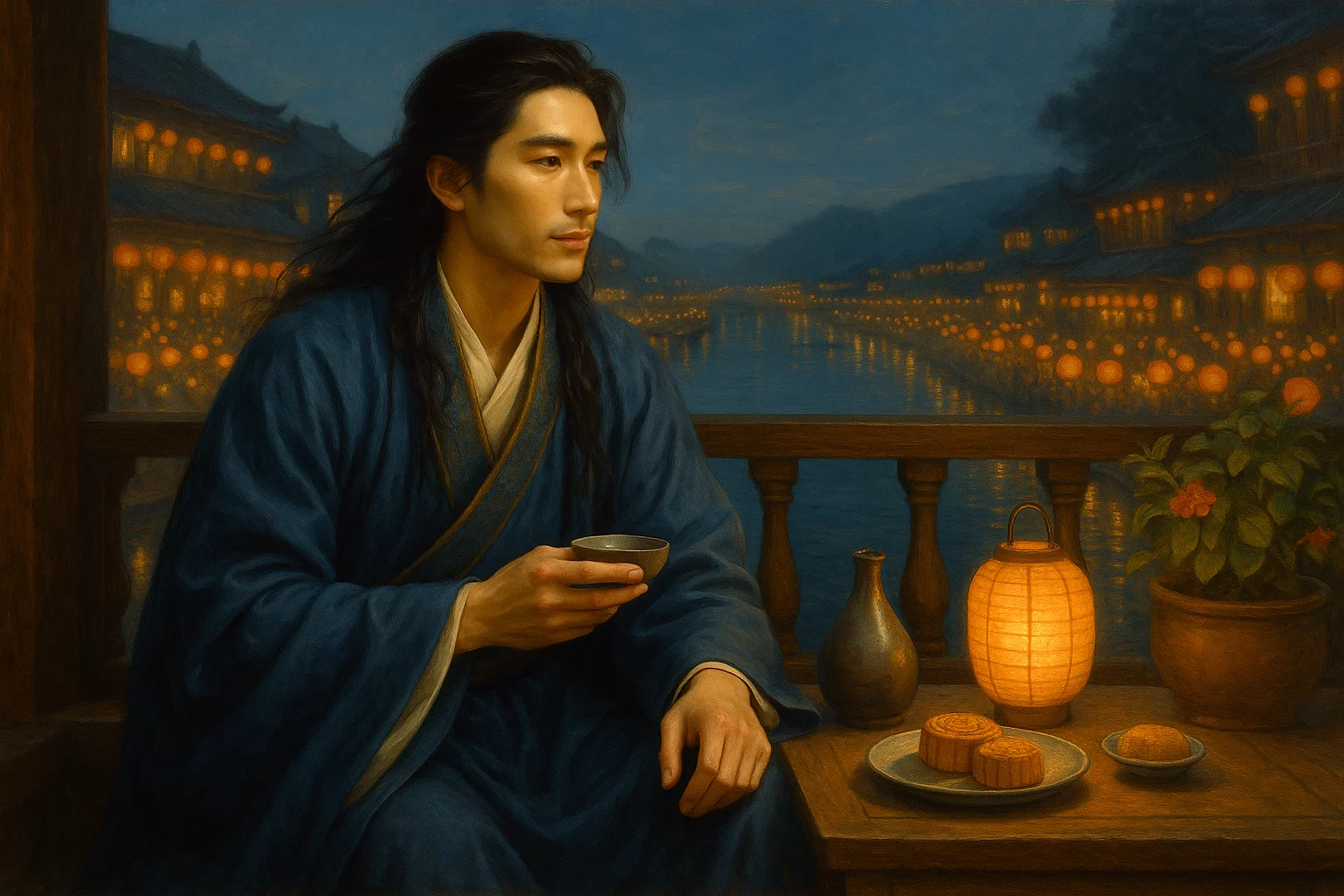
Zhou Bangyan (周邦彦 1056 - 1121), a native of Qiantang (modern Hangzhou, Zhejiang), was the culminating master of the wanyue (graceful and restrained) ci poetry of the Northern Song Dynasty. A virtuoso in musical temperament, his ci are renowned for their opulent refinement and technical perfection. He created dozens of new melodic patterns (cipai) and adhered to strict tonal rules, earning him the title "Crown of Ci Poets." His influence extended to Southern Song masters like Jiang Kui and Wu Wenying, establishing him as the founding patriarch of the Rhymed Ci School.








